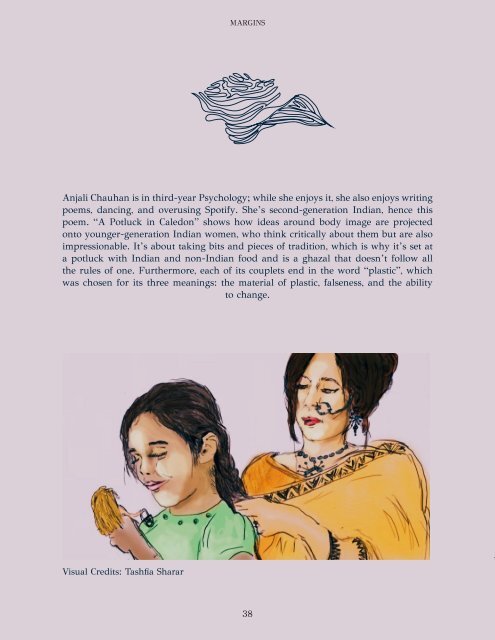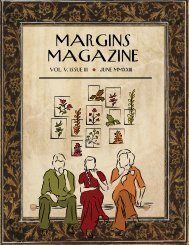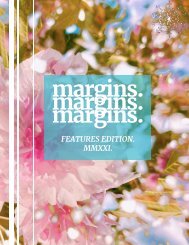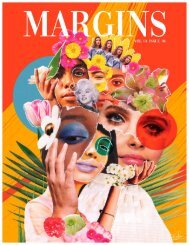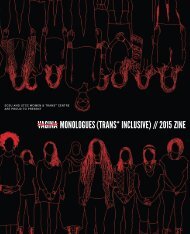Margins Magazine - Volume 3 Issue 1
2020 has been a year of immense change and upheaval thus far, with our idea around what is normal challenged in the midst of a pandemic. In this midst of these volatile times, our team at Margins Magazine has come together to create Volume 3 Issue 1 of our publication, revolving around the theme of CHANGE. In this issue, our writers have worked hard to bring you pieces that critically discuss the realities of the current moment from advocacy effort across different fields to issues such as domestic violence and colourist. At #UTSC, we connect with Radio FWD and UTERN at UTSC to learn how campus groups are affected during the pandemic and how they are evolving their programming while staying connected with students. We’ve received amazing creative submissions from members of our local community and around the world that have allowed us to curate this issue with stories that truly represent the heart, soul, and pulse of the current times. Bringing together all these voices in Margins has been a true labour of love. We truly hope that the stories, words, and art within Margins resonate with you. Follow us on Instagram @wtcmargins & LinkedIn https://www.linkedin.com/company/margins-magazine!
2020 has been a year of immense change and upheaval thus far, with our idea around what is normal challenged in the midst of a pandemic. In this midst of these volatile times, our team at Margins Magazine has come together to create Volume 3 Issue 1 of our publication, revolving around the theme of CHANGE.
In this issue, our writers have worked hard to bring you pieces that critically discuss the realities of the current moment from advocacy effort across different fields to issues such as domestic violence and colourist. At #UTSC, we connect with Radio FWD and UTERN at UTSC to learn how campus groups are affected during the pandemic and how they are evolving their programming while staying connected with students.
We’ve received amazing creative submissions from members of our local community and around the world that have allowed us to curate this issue with stories that truly represent the heart, soul, and pulse of the current times.
Bringing together all these voices in Margins has been a true labour of love. We truly hope that the stories, words, and art within Margins resonate with you.
Follow us on Instagram @wtcmargins & LinkedIn https://www.linkedin.com/company/margins-magazine!
You also want an ePaper? Increase the reach of your titles
YUMPU automatically turns print PDFs into web optimized ePapers that Google loves.
MARGINS<br />
MARGINS<br />
A Potluck in Caledon<br />
By Anjali Chauhan<br />
Here, the forks, cups, plates, and hate are plastic;<br />
recipes don’t change but the skill of serving is plastic.<br />
Anjali Chauhan is in third-year Psychology; while she enjoys it, she also enjoys writing<br />
poems, dancing, and overusing Spotify. She’s second-generation Indian, hence this<br />
poem. “A Potluck in Caledon” shows how ideas around body image are projected<br />
onto younger-generation Indian women, who think critically about them but are also<br />
impressionable. It’s about taking bits and pieces of tradition, which is why it’s set at<br />
a potluck with Indian and non-Indian food and is a ghazal that doesn’t follow all<br />
the rules of one. Furthermore, each of its couplets end in the word “plastic”, which<br />
was chosen for its three meanings: the material of plastic, falseness, and the ability<br />
to change.<br />
Like mothers from daughters (or aunties from aunties), plates<br />
segregate sambhar from sandwiches by septums of plastic.<br />
We choose food like we do sarees; we sit upstairs from our<br />
mothers, curate our seconds, and toss their dated plastic.<br />
Bandhani shrouding gulab-jamun guilt, they say of an actress,<br />
“yeah, the movie was good but now her nose looks too plastic.”<br />
Then to me, one commands, “eat more; you need it”, eagerly<br />
as some hastily hide biryani in tubs of recycled plastic.<br />
So, I eat leftover confetti cake she left over athanu,<br />
now reddened by sour oil spreading across plastic.<br />
She says, “Anjali, you girls are too quiet”, and I bite back a question:<br />
Do they know how we eat traditions, tongues tense and palates plastic?<br />
Visual Credits: Tashfia Sharar<br />
38 39


